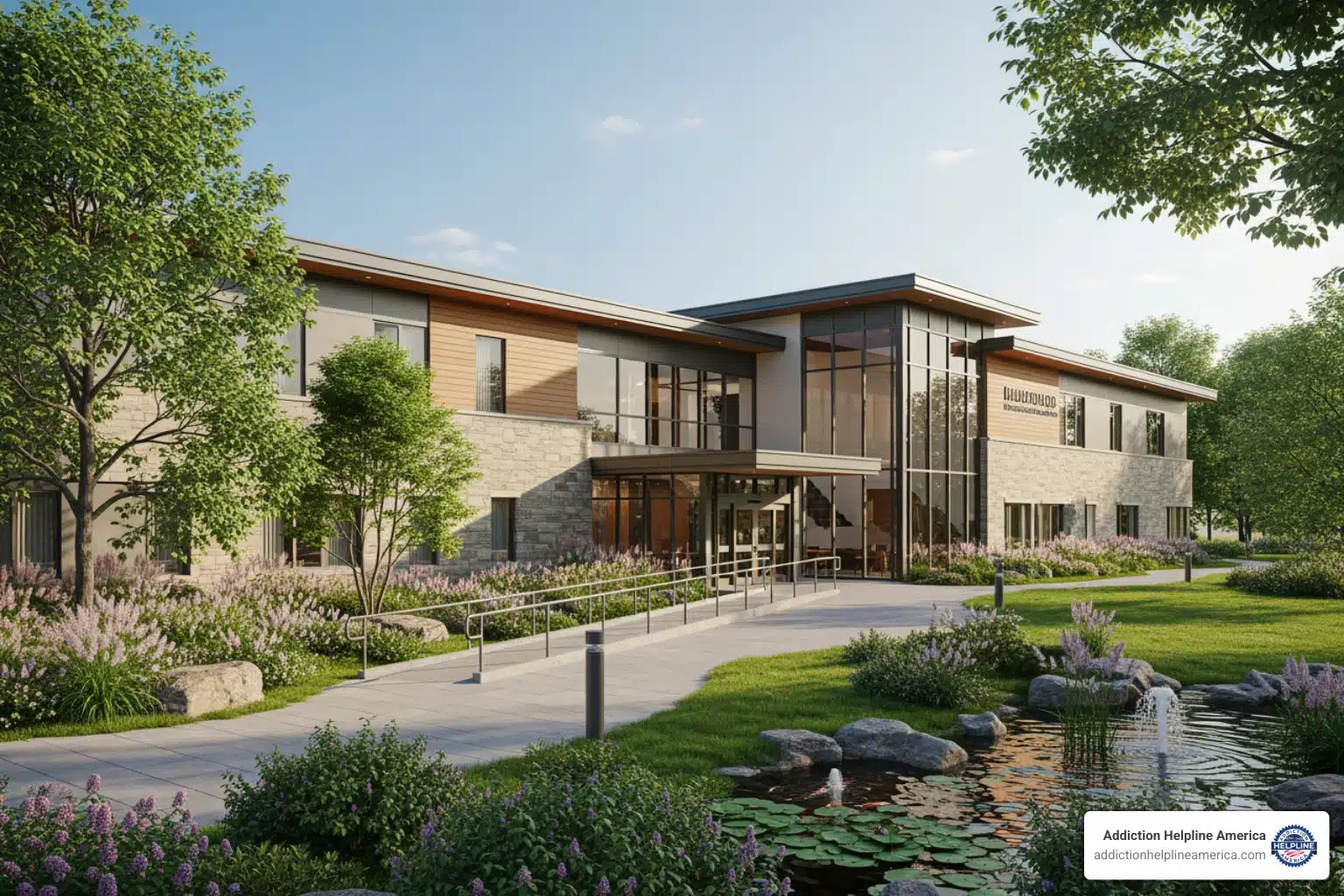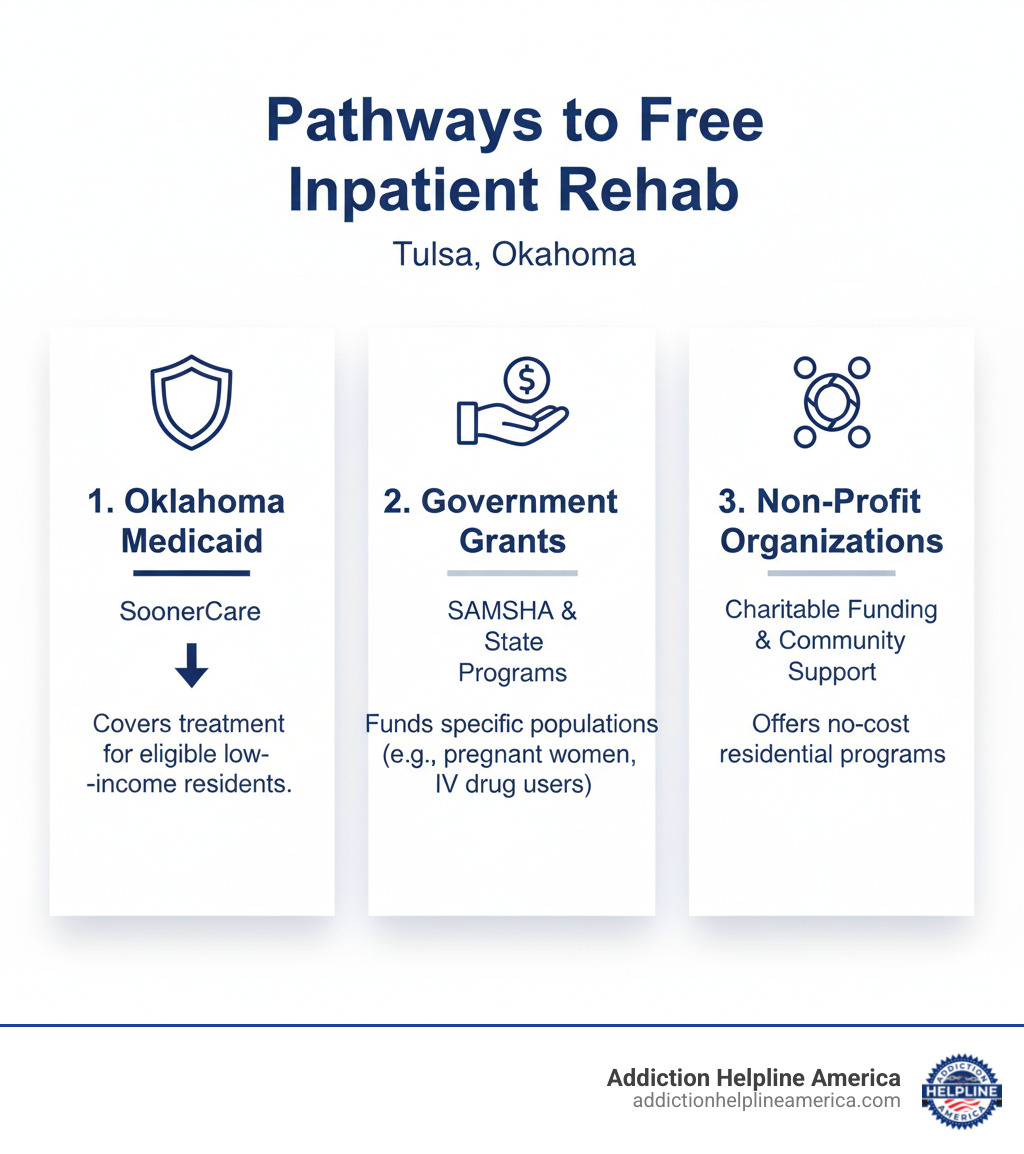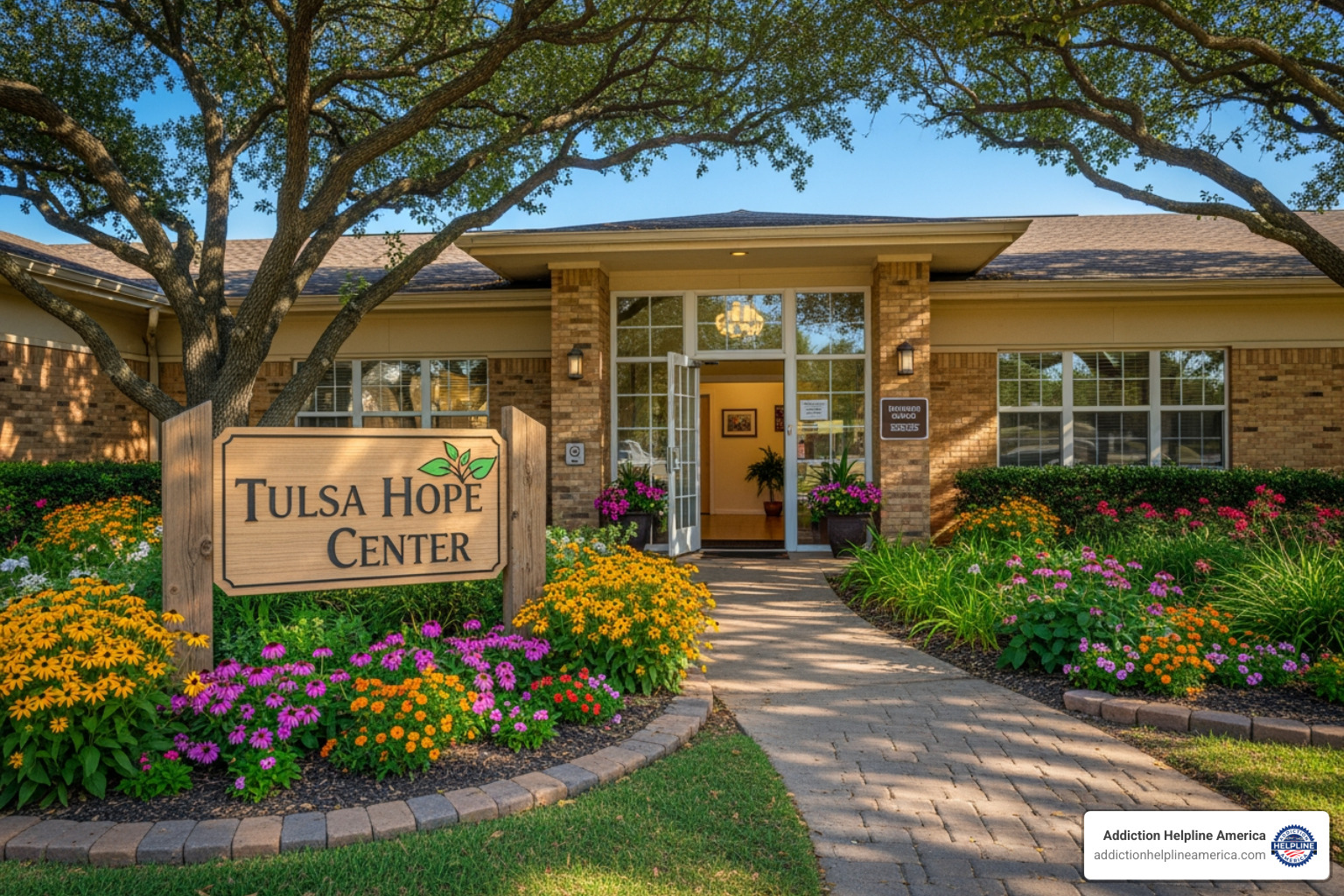
Your Path to Recovery in Tulsa Starts Here
Free inpatient drug rehab centers in tulsa oklahoma are available now. You can access them through Medicaid (SoonerCare), state and federal grants, non-profits, and payment assistance programs. Here’s how to start:
Three Ways to Access Free Inpatient Rehab in Tulsa:
- Apply for SoonerCare (Oklahoma Medicaid) – Covers addiction treatment for eligible residents based on income and household size.
- Contact non-profit and community-funded centers – Organizations like the H.O.W. Foundation offer no-cost residential recovery programs.
- Ask about sliding scale fees and payment assistance – Many facilities adjust costs based on your ability to pay or help you access government funding.
Cost should never be a barrier to getting help. Oklahoma provides multiple pathways to free or low-cost inpatient addiction treatment, allowing you to find a program that fits your needs without financial stress.
As Addiction Helpline America, we’ve guided thousands toward recovery by finding free inpatient drug rehab centers in tulsa oklahoma and nationwide. We connect people with treatment options matching their financial and recovery needs, ensuring everyone has access to support, regardless of ability to pay.
Basic free inpatient drug rehab centers in tulsa oklahoma vocab:
Thing 1: Understand How “Free” Rehab Works
Yes, free inpatient drug rehab centers in tulsa oklahoma are real. We understand that financial worries can feel like a barrier to treatment, but you don’t need thousands of dollars to access quality inpatient care. “Free” rehab programs are funded by government sources, charitable donations, and non-profits, allowing them to offer services at no or low cost. While there can be drawbacks like waitlists, the important thing is that you can access life-saving treatment without paying thousands out of pocket.
How Public Funding and Assistance Make Treatment Possible
Public funding is the main source of free addiction treatment in Oklahoma, with SoonerCare (Oklahoma’s Medicaid program) as its foundation. SoonerCare covers addiction treatment, including inpatient care, for low-income residents. This coverage often includes medically supervised detox and Medication-Assisted Treatment (MAT). To see if you qualify, visit the Oklahoma Health Care Authority—Oklahoma’s Medicaid Agency website. The application is worth the effort and can provide immediate access to help.
Beyond SoonerCare, federal and state grants from agencies like the Substance Abuse and Mental Health Services Administration (SAMHSA) also fund treatment. These grants often prioritize vulnerable populations like pregnant women, women with dependent children, and people who use intravenous drugs. These public funds are systems designed to save lives.
Community-Based and Non-Profit Support
Tulsa’s network of non-profit organizations provides another path to free treatment. These 501(c)(3) charities run on donations and grants, with a mission focused on recovery, not profit.
The H.O.W. Foundation is a notable no-cost residential recovery program for men in Tulsa. Its unique approach involves staff who are all program graduates, providing peer-based understanding. Other facilities like Palmer Continuum of Care Inc – Tulsa Women and Childrens Center, Calm Center, and Resonance Center for Women offer payment assistance or sliding fee scales based on income. Many of these centers focus on specific populations—women, adolescents, or people with trauma histories—and provide specialized care. While these programs may have waitlists due to high demand, they are staffed by people who genuinely care about your recovery.
Using Insurance and Payment Assistance
If you have private health insurance, the Mental Health Parity and Addiction Equity Act (MHPAEA) requires most plans to cover addiction treatment. This applies to employer-sponsored plans, Medicaid, Medicare, and TRICARE. Addiction Helpline America can help you verify your benefits to see what your insurance will pay for.
Even without insurance, many Tulsa facilities offer sliding scale fees, adjusting the cost based on your income. Some centers also have access to state vouchers or tribal funds. The most important step is to call facilities and ask about all available payment options. Don’t assume you can’t afford treatment—we’re here to help you find a program that works for your situation.
Thing 2: Identify Potential Free Inpatient Drug Rehab Resources in Tulsa, Oklahoma
Once you understand how free rehab works, the next step is finding the right place. Tulsa has a strong network of treatment options, and we’re here to help you steer them. Research shows there are 4 inpatient drug & alcohol rehab centers and 15 free treatment programs available in Tulsa, each with different approaches.
Local No-Cost and Low-Cost Treatment Options
When looking for free inpatient drug rehab centers in tulsa oklahoma, several community-supported facilities offer accessible treatment. These centers use evidence-based methods and provide payment assistance to make care affordable.
-
The H.O.W. Foundation: A completely no-cost residential program for men struggling with addiction. The program is based on the Twelve Steps and is run by staff who have all completed the program themselves.
-
Palmer Continuum of Care Inc – Tulsa Women and Childrens Center: Focuses on adult women, including pregnant or postpartum mothers, and allows children to stay during treatment. They provide a safe space for women dealing with trauma, abuse, and co-occurring mental health disorders.
-
Resonance Center for Women: Serves adult women, including those with court referrals, histories of domestic violence or trauma, and co-occurring disorders. They offer a trauma-informed approach and specialized programs for pregnant/postpartum women.
-
Calm Center: Provides services for adolescents and young adults dealing with addiction alongside issues like trauma, abuse, and mental health disorders.
-
Human Skills and Resources Inc: Serves adult men and women, including veterans and those with court referrals. They specialize in addressing past trauma and co-occurring mental health disorders.
-
Keetoowah Cherokee Treatment Services: Offers programs for adult men and women, with specialized services for pregnant/postpartum women, veterans, and individuals with trauma histories.
-
Eastern Oklahoma VA Healthcare System / Tulsa VA Outpatient Clinic: Offers specialized programs for veterans, including those with court referrals, combining addiction treatment with support for PTSD and other mental health disorders.
Many of these facilities provide dual diagnosis treatment, addressing both addiction and mental health simultaneously, which is crucial for preventing relapse. For a deeper look at what’s available, check out our guide: More info about Tulsa treatment options. We can help you steer these options to find the right fit for your situation.
Thing 3: Take Action and Prepare Your Application
You’ve learned how free rehab works and identified potential centers. Now it’s time to take action. The application process for free inpatient drug rehab centers in tulsa oklahoma requires some preparation, but it’s manageable. Don’t let paperwork or potential waitlists discourage you; they are temporary obstacles on the path to recovery.
Gather Your Essential Documents
To speed up your application, gather essential documents before contacting centers. Most state-funded and non-profit programs require proof of residency and financial need. Having these ready will streamline the process. Key documents include:
- Proof of income (pay stubs, tax return, unemployment statements)
- Proof of Oklahoma residency (utility bill, driver’s license, lease)
- Photo ID and Social Security card
- Insurance information (including your SoonerCare/Medicaid card)
- Medical history (past treatment, diagnoses, current medications)
If you’re missing a document, don’t let it stop you. Many facilities will help you obtain what’s needed. The key is to start the conversation.
Contact Centers and Ask the Right Questions
Once your documents are ready, contact multiple facilities. Availability and programs vary, so exploring several options will help you find the best fit. Be honest about your circumstances and ask direct questions:
- What are the eligibility requirements for free or low-cost treatment?
- What is the typical length of stay?
- What services are included (medical detox, therapy, MAT, dual diagnosis support)?
- How long is the current waitlist?
- Are there family involvement policies?
- What aftercare planning and support is offered (sober living, support groups)?
- What specific therapeutic approaches are used (CBT, DBT, 12-Step)?
Understanding their treatment philosophy helps you determine if it’s the right match.
Use Local Resources to Find Free Inpatient Drug Rehab Centers in Tulsa, Oklahoma
You don’t have to do this alone. Tulsa and Oklahoma offer centralized resources to help you find treatment and other support.
-
Oklahoma 211: Dial 211 or visit Oklahoma 211 for free, confidential referrals to free inpatient drug rehab centers in tulsa oklahoma, plus housing, transportation, and mental health services.
-
Family & Children’s Services: This Certified Community Behavioral Health Clinic (CCBHC) in Tulsa offers comprehensive services, including counseling, housing support, and substance use treatment. Learn more at Family & Children’s Services.
-
Oklahoma Network of Care: This website has an easy-to-use tool to find state resources by service type and zip code.
These resources exist to help you. And remember, we at Addiction Helpline America are also here to provide free, confidential guidance.
Frequently Asked Questions about Free Rehab in Tulsa
How long is a typical stay in a free inpatient rehab?
The length of stay in a free inpatient drug rehab center in tulsa oklahoma varies based on individual needs and addiction severity. There is no one-size-fits-all timeline. Detox typically lasts a few days to a week, focusing on safe withdrawal management. Residential treatment can last several weeks to months, especially for those with severe addiction or co-occurring mental health disorders. The duration is determined by clinical need, not a fixed calendar. A quality program will work with you to create a transition plan when you are ready for the next step in recovery.
How do I qualify for Oklahoma’s Medicaid (SoonerCare) to pay for rehab?
SoonerCare, Oklahoma’s Medicaid program, covers addiction treatment, including inpatient care, for eligible low-income residents. It’s a key way to access free inpatient drug rehab centers in tulsa oklahoma. Qualification is primarily based on your income and household size. Other factors like pregnancy, disability, or having dependent children can also affect eligibility. The application requires proof of income, residency, and household composition. Visit the Oklahoma Health Care Authority—Oklahoma’s Medicaid Agency website or call them for current criteria and application guidance. Don’t assume you won’t qualify without checking.
What happens after completing a free inpatient drug rehab program in Tulsa, Oklahoma?
Completing inpatient rehab is a major achievement, but it’s the start of a lifelong recovery journey. Most free inpatient drug rehab centers in tulsa oklahoma help you create a comprehensive aftercare plan before you leave. This personalized roadmap is designed to support your continued sobriety and may include:
- Relapse prevention strategies: Learning practical coping skills to manage triggers and cravings.
- Support groups: Connecting with peers in groups like Alcoholics Anonymous (AA) or Narcotics Anonymous (NA) for ongoing accountability.
- Sober living arrangements: Transitioning to a structured, substance-free home to solidify recovery skills.
- Outpatient counseling: Continuing individual or group therapy while resuming daily life.
- Community resources: Getting connected to employment, housing, and mental health services.
Asking for help after treatment is a sign of strength. We’re here to connect you with the aftercare resources you need to thrive.
Take the First Step Towards a New Life
Taking the first step toward recovery can feel overwhelming, but it’s where change begins. Recovery from addiction is possible, and it’s happening right now in free inpatient drug rehab centers in tulsa oklahoma.
You’ve learned how free rehab works, where to find local resources, and how to prepare your application. Financial barriers are real, but Oklahoma has pathways to help you access quality treatment regardless of your ability to pay. Whether through Medicaid, sliding scale fees, or fully funded non-profits like the H.O.W. Foundation, help is available.
As Addiction Helpline America, we are dedicated to making that help easy to find. We provide free, confidential guidance to connect you with the right program from our vast network. You don’t have to figure this out alone. One conversation can change everything.
The life you want is on the other side of asking for help. Don’t let another day pass. It is possible.
Our helpline is 100%
free & confidential
If you or someone you care about is struggling with drug or alcohol addiction, we can help you explore your recovery options. Don’t face this challenge alone—seek support from us.
Programs
Resources
Will my insurance
cover addiction
treatment?
We're ready to help
Find the best
drug or alcohol treatment
center
Are you or a loved one struggling with addiction? Call today to speak to a treatment expert.
















